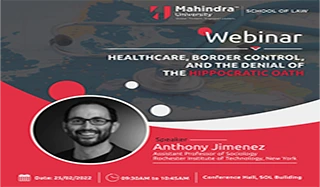‘Healthcare, Border Control, and the Denial of the Hippocratic Oath’

Access to medicine, irrespective of legal Identity
Denying medical care to the migrants for not having proper legal identity is a serious problem. For tackling it, proper formal and informal systems should be developed that would help improve access to health care, said Dr Anthony M Jimenez, Assistant Professor of Sociology from Rochester Institute of Technology, New York, at a webinar special lecture at School of Law, Mahindra University, on 25th February, 2022. Speaking on legal and sociological aspects of regulating the medical care, he explained how the illegal migrants are encountered with denial, deportation, and detention, because of lack of a ‘legal’ identity. He gave example of a 26-year-old patient who was denied preventive care and surgical support, which subsequently led to a complete failure of kidney. He said that such a denial will compel the patients to commit acts which takes them to jail, where they might get an identity, entitling them to access health care. While formal personal care homes provide medical support, a non-citizen does not fall within the purview of such services. He raised the question: ‘Where does such illegal migrant go for treatment?’ He will ultimately be left to wait for ‘death’ without treatment, that amounts to ‘detention’.
Dr. Anthony M. Jimenez is an Assistant Professor of Sociology at Rochester Institute of Technology. He grew up along the US-Mexico border in El Paso, Texas and completed his doctoral program at the University of Minnesota. His research, supported in part by the Ford Foundation, focuses on border imperialism and the intersections between immigration and healthcare. In his prospective Dr. Jimenez explores how COVID-19 has shaped migrants’ home health care options and experiences.
Dr. Anindita Chakrabarty faculty of Sociology welcomed the guest and moderated the lecture. Dr Anthony delivered the talk on the topic, ‘Healthcare, Border Control, and the Denial of the Hippocratic Oath’, which was followed by a Question and Answer (Q/A) session for the next 40 minutes. Dr Anthony engaged with the conceptual paradigms of illegality, access to health care, and the politics of inclusion. He delved with the question on ‘How does the health care system regulate illegality?’ and centred his analysis on three state-sanctioned border control operations – denial, detention, and deportation. The narratives cited from his ethnography enriched the presentation, and gave a conceptual clarity of the three, above mentioned, paradigms. The speaker responded to some very significant questions, put forward by a few faculty and students. Prof. Shruti Kakkar, asked on the nuanced understanding of refugeehood, and substantive and legal belonging of migrants; Prof. Neha Khurana, highlighted that India is not a signatory to the UN convention for refugees, and drew attention to the exclusion of immigrant populations residing in India from any international protection regime. Dr. Vivek Sehrawat, shared how health care access in India often would not be determined by similar documentary prerequisites as in the US.
The Dean, SoL, Mahindra University, Prof. Dr. Sridhar Acharyulu threw light upon the lack of health care access to migrants, despite it being a constitutional right of every person, i.e., not confined to citizens only, and highlighted how not possessing identifiers in the form of documentary citizenship plays a significant role in not only controlling mobility of populations, but also constrains access to health care in India. In his final remark, he particularly threw light upon the crisis triggered by the pandemic, and the lock-down in India, that brought out the brazen inequality and health access disparity between the migrant labourers and the natives, the non-citizens and the citizens. Prof. Alok Verma delivered the vote of thanks.









